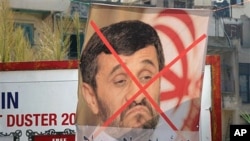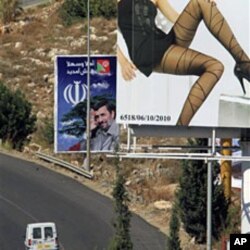Iranian President Mahmoud Ahmadinejad's controversial visit Wednesday to Lebanon is stirring up political tensions, with posters springing up across the country both to welcome him and others to say that he is not welcome.
The visit of Iranian President Mahmoud Ahmadinejad to Lebanon is stirring up a firestorm of debate on the airwaves of Lebanese and Arab satellite TV channels, in addition to arousing a frenzy of political wrangling.
The visit Wednesday comes at a time when Lebanon's pro-Iranian Hezbollah militia is engaged in a bitter feud with its adversaries over accusations that it may have been involved in the 2005 assassination of former Prime Minister Rafiq al Hariri. The group denies the charges, but some reports say a U.N. tribunal investigating the case could soon indict several members of the group.
Hezbollah's al-Manar TV showed images of Iranian flags floating from lampposts along parts of Lebanon's coastal highway. It also showed billboards with Mr. Ahmadinejad's picture, along with his claim that Israel is a "cancerous tumor."
Iranian TV showed workers repainting curbstones in the colors of the Iranian flag. It also spoke with a handful of Lebanese, who all appeared to applaud the Ahmadinejad visit. Other Arab satellite channels spoke with Lebanese who criticized the visit and showed posters in Beirut and the northern port city of Tripoli, condemning the Islamic Republic.
Lebanese leaders appear divided over the controversial visit, with Hezbollah ally Michel Aoun calling Mr. Ahmadinejad a modest man who is widely misunderstood. He urged Lebanese to welcome him, insisting that Iran "welcomes Lebanese leaders and Lebanon should do the same."
Top figures in the pro-Western March 14th coalition that supports Prime Minister Saad Hariri were mostly critical of Mr. Ahmadinejad's impending visit. Several complained that Iran treats Lebanon "like an Iranian base on the Mediterranean" and that the visit "could provoke strife."
The leader of the coalition partner National Liberal Party, Dory Chamoun, says the Iranian president is welcome, provided he makes no provocative statements:
"Anybody is welcome to visit Lebanon. I mean, we cannot say that we refuse his visit here," said Chamoun. "And, he is welcome to visit the country, to meet with our people and with the [officials] over here, and to respect our autonomy and our independence, and not to, hopefully, come out with any speeches that might put Lebanon in any sort of danger. But, we cannot judge him before he comes and let us see what he has to say."
The atmosphere of Mr. Ahmadinejad's trip to Lebanon is far from the unanimous show of respect shown to then Iranian President Mohammed Khatami, when he visited in 2003. Mr. Khatami was a well-liked figure in much of the Arab world, arousing little controversy.
American University of Beirut Political Science Professor Hilal Khashan says the Ahmadinejad visit has provoked the ire of many Lebanese, who see his presence as a show of support for the militant Hezbollah, which they find domineering:
"The Lebanese are highly divided. They are divided on everything, so the division [over] the visit of Ahmadinejad is conspicuous, because Ahmadinejad brings along with him controversy at a very bad time in Lebanon's history," Khashan said. "The Lebanese Shi'ites and [their] few Maronite allies are enthusiastic to see Ahmadinejad come. The rest of the Lebanese, most Maronites and I would say almost all Sunnis are angry because they see [the visit] as boosting Hezbollah's standing in Lebanese politics. It is already preponderant in Lebanon."
Hezbollah's leader, Sheikh Hassan Nasrallah, recently told Lebanese that they should be "thankful to Iran" for helping to rebuild their country after a bitter and bloody war with Israel in 2006. He urged them to turn out en masse to welcome President Ahmadinejad


